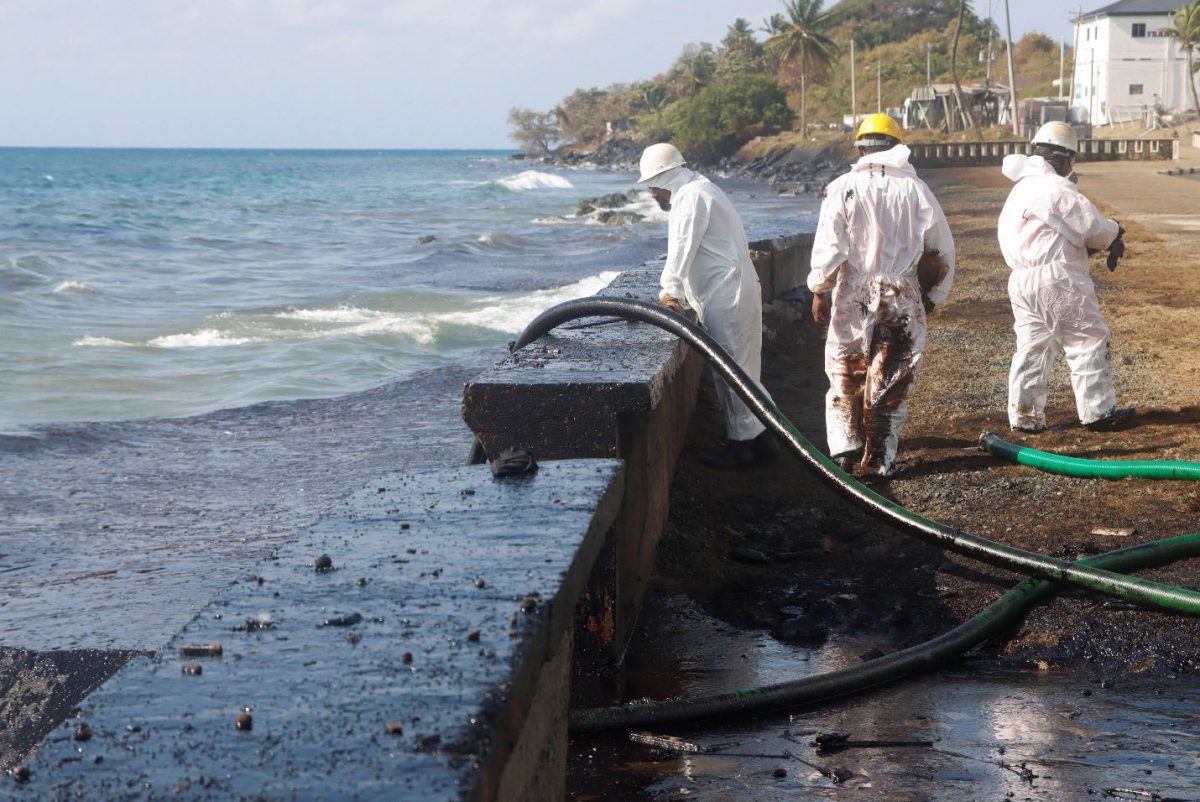Preliminary inquiries point to Guyana as the destination for a sunken barge spilling oil off Tobago’s coast but GPL yesterday it has not been advised by any of its suppliers of problems resulting in the loss of cargo.
With Trinidadian information pointing to Guyana as the destination for the fuel, that country’s Prime Minister Keith Rowley yesterday said that discussions are currently ongoing to determine the procuring entity.
Rowley’s statements comes even as the Guyana Power and Light Company (GPL) distanced itself from procuring the oil.
“We are still awaiting confirmation of all that we have heard so you will get the official position from Trinidad and Tobago. We are talking to the Guyanese [government] and are still awaiting some information. When that information comes in, it will confirm and be able to identify, once the information is good information,” Rowley yesterday told Stabroek News, on the sidelines of the Oil and Gas Conference at the Marriott Hotel, when asked for an update about the spill and the assertion of Trinidadian maritime Attorney Nyree Alfonso that the fuel was destined for this country.
“There is a lot of speculation going on right now. We are following all the leads to determine who was involved and if the cargo was coming to Guyana. We are attempting to identify who was the procuring entity of the cargo. That is where we are now. We don’t have information beyond that, but that is a good lead [that the fuel was destined for Guyana],” he added.
Guyana’s Prime Minister Mark Phillips who holds responsibility for this country’s power utility company told this newspaper yesterday that GPL had no consigned fuel from the vessel that the barge with fuel was being moved on. “Based on our investigation so far, there was no fuel consigned to GPL that was being moved by that boat,” Phillips stressed.
GPL last night issued a statement on the matter –two weeks after the spill occurred.
It said it was aware of the recent oil spill off the coast of Trinidad and Tobago and joined with the rest of Guyana in
expressing its concern regarding the environmental implications and impact on the people of Trinidad and Tobago.
It said that it tendered for the supply and delivery of Heavy Fuel Oil (HFO) in June 2023, via national competitive bidding. Six bids were received. The tender was awarded on October 24, 2023, to Staatsolie MaatSchappij Suriname N.V. (the first ranked bidder). An additional award for the supply and delivery of HFO was awarded to the joint venture Rapid Results Inc. and Osher International Holdings LLC (the second ranked bidder) to bolster GPL’s increasing consumption of HFO and supply requirements.
The terms of both contracts require the suppliers to deliver the fuel to GPL’s ports along the Demerara River.
“Title, ownership, and risk of loss for the fuel passes from the suppliers to GPL at the discharge port. GPL has not received any notification from any of its contracted fuel suppliers that they have encountered difficulties with their vessel(s) resulting in the loss of cargo. GPL therefore wishes to unequivocally state that the Company is not related to this unfortunate incident”, the utility said.
On February 7, 2024, a barge called the ‘Gulfstream’ was found overturned in the sea 200 metres off the coast of the Cove Industrial Park, Tobago. Trinidadian authorities said that it was being pulled by a tugboat-identified as the ‘Solo Creed’. The tugboat has not been found since the spill. The Trinidad Express also reported on Monday that maritime attorney, Alfonso, said that she had uncovered new information about the mysterious oil spill which has stained parts of the Tobago coastline and caused environmental damage. Alfonso noted that there have been several reports about the overturned vessel named ‘Gulfstream’ but this is possibly the old name of the barge, according to the Trinidad Express.
“Our information is that there is no ‘Gulfstream’ involved in this accident unless it happens to be the earlier name of the current barge. The barge that is turned upside down (in Tobago’s waters), her name is ‘Coolie Boy’ and we believe her to be owned by a Guyanese entity. The fuel was destined for Guyana,” she told the newspaper via telephone. “Our information is that the consignee is a Guyanese entity. The ‘Solo Creed’ came through the Panama Canal empty, meaning not without a tow and went somewhere by Aruba and collected ‘Coolie Boy’ and was passing through Trinidad and Tobago on its way to Guyana,” she said.
She said investigations will determine whether something transpired with the barge itself and whether it sprang a leak or whether the ‘Solo Creed’ tug negligently maneuvered it and the barge hit something, causing it to run into trouble. Alfonso said she believed that after the barge started leaking the ‘Solo Creed’ “cut her lines and buss it and gone”. She said the ‘Solo Creed’ was flagged in Tanzania and more than likely went through the Panama Canal where it would have submitted all its documents to officials there. She said an alert should have been issued to the Panama Canal in the search for the ‘Solo Creed’.
Alfonso explained that there is a difference between a barge and a tug—as most “dumb barges” can “hide” since they do not have an Automatic Identification System (AIS) or GPS tracking. She said that when a vessel is trying to hide, they turn off the AIS tracking which is satellite-based but sooner or later it has to be turned back on. “There are countries that do not allow you to come in their waters with (your) AIS off,” she said. Alfonso said she did her research on the incident because members of the media had been reaching out to her for her expert opinion. “I was able to find out that ‘Mr. Solo Creed’ coming through the Panama Canal picked up a barge called the ‘Coolie Boy’ and he headed to Guyana,” she said.
Alfonso told the Trinidadian publication that the tugboat must be held liable. “In the ordinary course of things, when there is an accident with a tug and a barge, the tug is held responsible because it is manoeuvring the barge which cannot manoeuvre on its own. Maritime law holds the manoeuvring vessel liable,” she said. Trinidad and Tobago’s Maritime Services Division, she said, should be reaching out to its counterparts and issuing alerts for the ‘Solo Creed’. “They need to track down the ‘Solo Creed’ and find out who her owners are. Our Maritime Division can call up the maritime authorities in Tanzania and get the details,” she said.
Meanwhile, the Caribbean Disaster Emergency Management Agency (CDEMA) yesterday said that the Office of Disaster Preparedness and Management (ODPM), Trinidad and Tobago informed the CDEMA Coordinating Unit of a report of February 7 th, notifying of an overturned vessel in the vicinity of the waters off the coast of Cove Eco Industrial and Business Park, Tobago, and of a resulting oil spill.
“Trinidad and Tobago has implemented its National Oil Spill Contingency Plan and at this time no request for assistance has been made to the CDEMA Coordinating Unit. The Coordinating Unit has been monitoring the event since its occurrence through appropriate consultations with Participating States and regional partners. The Coordinating Unit stands ready to provide assistance through the Regional Response Mechanism (RRM) should this be requested”, a release from CDEMA said.










